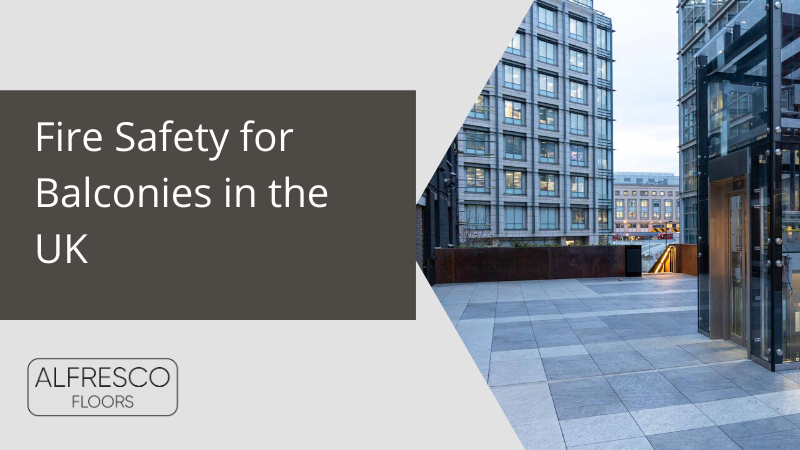
14 Jul Fire Safety For Balconies in the UK

Balconies serve an incredible purpose to residents and tenants in tall buildings across the UK. Since not all homeowners have access to a garden in their dwelling, they turn to their balcony for fresh air and the ability to enjoy a bit of sunlight. Never has this been felt so keenly as during our recent months of lockdown.
For those working in a high-rise building – or even enjoying a leisurely lunch in such a space, balconies offer very similar benefits to both tenants, owners and customers alike.
Balconies improve mood and grants the ability to take in much needed Vitamin D.
While it is important for users to be able to access the outdoors from their apartment, hotel, or office, balconies should utilise materials in such a way that inhibit the spread of fire.
Why Is Non-Combustible Balcony Flooring Required?
Due to recent fires in multi-storey residential buildings, the UK government passed certain regulations that required Class A-rated materials to be specified on balconies for tall buildings over 18 metres. These regulations are in place to protect UK citizens and should be front of mind when designing new or renovated high-rise buidings.

Examples of Class A Rated Materials
Not all materials can boast a Class A rating. In fact, only a few materials pass the UK’s regulations for fire safety on balconies:
The above materials are non-combustible, which means they do not easily catch fire or spread flames. In addition, most of these materials either do not produce smoke at all or they produce very small amounts. In comparison, Class-B rated materials are only fire-resistant and can still combust under certain conditions, which is why they are not permitted on balconies of 18 metres or higher buildings.
Why Non-Combustible Balcony Flooring Systems Are Vital
It is just as important for the decking pedestal system to be non-combustible as it is for the flooring material itself. If outdoor porcelain floors are laid on a combustible decking pedestal system, balconies are still at risk of contributing to a fire.
Non-combustible balcony paving systems ensure that tenants are safe in the event of a fire. The latest development in decking pedestal systems is the A-Ped Adjustable Pedestals. These A1-rated pedestals are designed to work in conjunction with other Class A-rated materials to ensure outdoor porcelain tiles, external concrete paving, and other flooring materials will not combust during a fire.
Alfresco Flooring’s adjustable pedestals far exceed the industry’s standard requirements.
Class A-Rated Materials Create The Safest Balconies
UK regulations only require Class A-rated materials on buildings over 18 metres in height. Smaller buildings can be utilise Class-B rated materials. However, the safest balconies for users in the UK will be ones that use non-combustible external balcony flooring in conjunction with non-combustible balcony paving systems. Contact one of our experts to learn more about how our systems can keep tenants in your building safe.




Pingback:What Are The Benefits of Aluminium Decking? - Alfresco Floors
Posted at 12:09h, 07 August[…] that it can be safely used on specified attachments above 18 metres in height. Examples include balconies, walkways, terraces and roof […]
Pingback:Fire-Rated Pedestals: The Hidden Heroes - Alfresco Floors
Posted at 13:42h, 08 September[…] Therefore, fire-rated pedestals have been especially designed for use in high-rise flooring projects. These may include (but are not limited to) balconies, terraces, walkways, roof gardens and winter gardens. […]